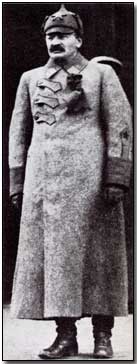Memoirs & Diaries - The Russo-German Armistice

Introduction
With the success of the Bolshevik October Revolution, and in the wake of Leon Trotsky's stated intention to seek an early armistice on all sides, a party of delegates was promptly despatched in late November to meet with German Army officers to discuss Russia's armistice proposals.
Reproduced below is a short memoir written by a Russian delegate to the initial armistice negotiations conducted on 1 December 1917, Kameneff. In his memoir Kameneff outlined the nature of the Russian armistice request and the quick - and positive - reaction of the German high command.
Click here to read the text of the preliminary armistice agreement.
We crossed the line, preceded by a trumpeter carrying a white flag. Three hundred yards from the German entanglements we were met by German officers.
At 5 o'clock, our eyes blindfolded, we were conducted to a battalion staff of the German Army, where we handed over our written authorization from the National Commissaries to two officers of the German General Staff, who had been sent for the purpose.
The negotiations were conducted in the French language. Our proposal to carry on negotiations for an armistice on all the fronts of belligerent countries, in order later to make peace, was immediately handed over to the staff of the division, whence it was sent by direct wire to the staff commander of the eastern front and to the chief commander of the German armies.
At 6.20 o'clock we were taken in a motor car to the Minister's house on the road from Dvinsk to Ponevyezh, where we were received by Divisional General von Hoffmeister, who informed us that our proposal had been handed to the highest commander, and that a reply probably would be received in twenty-four hours.
But at 7.30 o'clock the first answer from the chief of the general command already had been received, announcing agreement to our proposals, and leaving the details of the next meeting to General von Hoffmeister and the Parliamentarians.
After an exchange of opinion and further communication by wire from the chief of the general command, at midnight a written answer to our proposal was given to us by von Hoffmeister. In view of the fact that ours was written in Russian, the answer was given in German. The reply was:
The chief of the German eastern front is prepared to enter into negotiations with the Russian chief command.
The chief of the German eastern front is authorized by the German Commander in Chief to carry on negotiations for an armistice. The chief of the Russian armies is requested to appoint a commission with written authority to be sent to the headquarters of the commander of the German eastern front. On his side, the German commander likewise will name a commission with special authorization.
The day and hour of the meeting are to be fixed by the Russian Commander in Chief. It is demanded that the German commander be warned in due time to prepare a special train for the purpose. Notice must be given at which part it is intended to cross the front.
The commander of the German eastern front will place at the disposition of the Russian commission the necessary apparatus, so that it may keep in communication with its chief command.
(Signed) Von HOFFMEISTER.
The Russian Parliamentarians decided to appoint as the place the junction of the Dvinsk-Vilna line, whence the Russian representatives will be conducted to the Brest-Litovsk headquarters of the German commander. The time appointed is midday of November 19th (Russian calendar, or December 2nd, new calendar).
At the same time we were informed that no firing would occur unless prompted, and that enemy fraternization would be stopped. We were blindfolded again and conducted to our lines.
Source: Source Records of the Great War, Vol. V, ed. Charles F. Horne, National Alumni 1923
A 'Tour' was a period of front-line service.
- Did you know?
